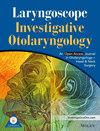Attitudes Towards the HPV Vaccine Among Oropharyngeal Cancer Patients in a Post-COVID World
Abstract
Objective
To assess the relationship between COVID and HPV vaccine hesitancy among oropharyngeal cancer patients and the effects of the pandemic on vaccine hesitancy.
Methods
A 25-question survey was developed to assess patient demographics, background information, and attitudes towards both the HPV and COVID-19 vaccines. The survey was administered in person to patients with a history of p16+ oropharyngeal squamous cell carcinoma (OPSCC). Results were statistically analyzed for significant associations between various factors relating to hesitancy.
Results
A high school education or higher was significantly associated with patients who would recommend the COVID-19 vaccine to others and trust their health care provider's recommendations about COVID-19 vaccination. Education was only a significant factor with regard to HPV vaccination when patients were asked about vaccination restricting their autonomy. Several significant associations were found between similar attitudes towards both the COVID-19 vaccine and HPV vaccine, including safety, autonomy, concerns about government intervention, and likelihood of vaccine recommendation. No significant association was found between the pandemic and change in views on vaccination.
Conclusion
Although the COVID-19 pandemic did not seem to affect many OPSCC patients' views on vaccination one way or another, we did uncover similar trends in vaccine hesitancy between the newer COVID-19 vaccine and older HPV vaccine. Our results indicate that established safety and history of a vaccine are likely very minor players in vaccine hesitancy, and efforts toward vaccine acceptance should be focused on patient background factors, including education and trust.

 求助内容:
求助内容: 应助结果提醒方式:
应助结果提醒方式:


